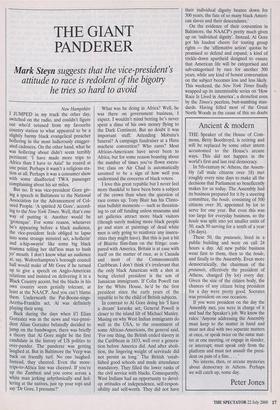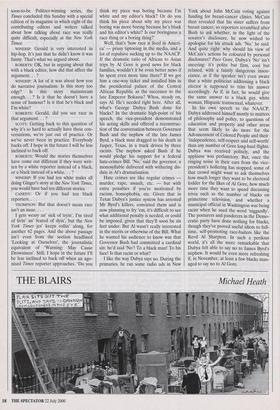THE GIANT PANDERER
Mark Steyn suggests that the vice-president's
attitude to race is redolent of the bigotry he tries so hard to avoid
New Hampshire I JUMPED in my truck the other day, switched on the radio, and couldn't figure out who'd retuned from my favourite country station to what appeared to be a slightly barmy black evangelical preacher hollering in the most ludicrously exagger- ated cadences. On the other hand, what he was hollering about didn't seem terribly pertinent: have made more trips to Africa than I have to Asia!' he roared at one point. Perhaps it wasn't a religious sta- tion at all. Perhaps it was a consumer show with some disaffected TWA passenger complaining about his air miles. But no. It was vice-president Gore giv- ing a speech in Baltimore to the National Association for the Advancement of Col- ored People. 'A spirited Al Gore', accord- ing to the New York Times. Well, that's one way of putting it. Another would be `grotesque'. For some reason, whenever he's appearing before a black audience, the vice-president feels obliged to lapse into some strange minstrel act, a-hollerin' and a-hip-swayin' like some big black mamma telling her shifless man to hush yo' mouth. I don't know what an audience at, say, Wolverhampton's borough council hall would make of Mr Gore if he turned up to give a speech on Anglo-American relations and insisted on delivering it in a Black Country accent, but the blacks in his own country seem genially tolerant, at least at the NAACP. And you can't blame them. Underneath the Pat-Boone-sings- Aretha-Franldin act, Al was definitely playing their song.
Back during the days when li'l Elian Gonzalez was in the news and vice-presi- dent Alian Gorzalez belatedly decided to jump on the bandwagon, there was briefly a theory that Al Gore might be the first candidate in the history of US politics to over-pander. The panderer was getting laughed at. But in Baltimore the Veep was back on friendly turf. No one laughed. Instead, they cheered. Even the more- trips-to-Africa line was cheered. If you're up the Zambezi and you come across a white man jerking arhythmically and hol- lering at the natives, just tip your topi and say 'Dr Gore, I presume?' What was he doing in Africa? Well, he was there on government business, I expect. I wouldn't mind betting he's never spent a dime of his own money flying to the Dark Continent. But no doubt it was important stuff. Attending Mobutu's funeral? A campaign fundraiser at a Hutu machete convention? Who cares? Most African-Americans have never been to Africa, but for some reason boasting about the number of times you've flown execu- tive class on Air Chad is automatically assumed to be a sign of how well you understand the concerns of black voters.
I love this great republic but I never feel more thankful to have been born a subject of the crown than when the question of race comes up. Tony Blair has his Clinto- nian bullshit moments — such as threaten- ing to cut off funding unless museums and art galleries attract more black visitors (though surely making more black people go and stare at paintings of dead white men is only going to reinforce any insecu- rities they might have). But this is just a bit of Blairite flim-flam on the fringe: com- pared with America, Britain is at ease with itself on the matter of race, as is Canada and most of the Commonwealth Caribbean. I don't think it's irrelevant that the only black American with a shot at being elected president is the son of Jamaican immigrants. If Colin Powell ran for the White House, he'd be the first president since the early years of the republic to be the child of British subjects.
In contrast to Al Gore doing his 'I have a dream' karaoke act, General Powell is closer to the island lilt of Michael Manley. Musing on why West Indian immigrants do well in the USA, to the resentment of some African-Americans, the general said, `For one thing, the British ended slavery in the Caribbean in 1833, well over a genera- tion before America did. And after aboli- tion, the lingering weight of servitude did not persist as long.' The British 'estab- lished good schools and made attendance mandatory. They filled the lower ranks of the civil service with blacks. Consequently, West Indians had an opportunity to devel- op attitudes of independence, self-respon- sibility and self-worth. They did not have their individual dignity beaten down for 300 years, the fate of so many black Ameri- can slaves and their descendants.'
On the evidence of their convention in Baltimore, the NAACP's pretty much given up on 'individual dignity'. Instead, Al Gore got his loudest cheers for touting group rights — the 'affirmative action' quotas he promised to defend and expand, a kind of trickle-down apartheid designed to ensure that American life will be categorised and sub-categorised by race for another 300 years, while any kind of honest conversation on the subject becomes less and less likely. This weekend, the New York Times fmally wrapped up its interminable series on 'How Race Is Lived in America', a dronefest even by the Times's peerless, butt-numbing stan- dards. Having felled most of the Great North Woods in the cause of this no doubt soon-to-be Pulitzer-winning series, the Times concluded this Sunday with a special edition of its magazine in which eight of the contributing editors and writers talked about how talking about race was really quite difficult, especially at the New York Times: WINERIP: Gerald is very interested in hip-hop. It's just that he didn't know it was funny. That's what we argued about.
ROBERTS: OK, but in arguing about that with a black editor, how did that affect the argument. . . ?
WINERIP: A lot of it was about how you do narrative journalism: Is this story too edgy? Is this story mainstream enough. . . ? Is it that he doesn't have a sense of humour? Is it that he's black and I'm white?
ROBERTS: Gerald, did you see race in that argument. . ?
scoTr: Getting back to this question of why it's so hard to actually have these con- versations, we're just out of practice. Or we've never been in practice. Everybody backs off. I hope in the future I will be less inclined to back off.
ROBERTS: Would the stories themselves have come out different if they were writ- ten by a white reporter instead of a black, or a black instead of a white. . . ?
WINERIP: If you had ten white males all doing Ginger's story at the New York Times, you would have had ten different stories.
CANEDY: Or if you had ten black reporters. . . .
THOMPSON: But that doesn't mean race isn't an issue. . . .
I gets weary an' sick of tryin', I'm tired of livin' an' feared of dyin', but the New York Times jes' keeps rollin' along, for another 62 pages. And the above passage isn't even from the section headlined `Looking at Ourselves', the journalistic equivalent of 'Warning: May Cause Drowsiness'. Still, I hope in the future I'll be less inclined to back off when an ago- nised Times reporter approaches. 'Do you think my piece was boring because I'm white and my editor's black? Or do you think his piece about why my piece was boring was more boring because he's black and his editor's white? Is our boringness a race thing or a boring thing?'
Well, that's 'how race is lived in Ameri- ca' — prissy tiptoeing in the media, and a lot of repulsive sucking up to the NAACP. If the dramatic ratio of African to Asian trips by Al Gore is good news for black families, wouldn't it be even better news if he spent even more time there? If we got him a one-way ticket and installed him in the presidential palace of the Central African Republic as the successor to the late Emperor Bokassa? Whoa, steady on, says Al. He's needed right here. After all, what's George Dubya Bush done for blacks? In the dramatic high-point of his speech, the vice-president demonstrated his acting skills and offered a reconstruc- tion of the conversation between Governor Bush and the nephew of the late James Byrd, a black man dragged to his death in Jasper, Texas, in a truck driven by three racists. The nephew asked Bush if he would pledge his support for a federal hate-crimes Bill. 'No,' said the governor, a monosyllable delivered with withering dis- dain in Al's dramatisation.
Hate crimes are like regular crimes murder, rape, assault, etc. — but with extra penalties if you're motivated by racism, homophobia, etc. Given that in Texas Dubya's justice system has arrested Mr Byrd's killers, convicted them and is now planning to fry 'em, it's difficult to see what additional penalty is needed, or could be imposed, given that they'll soon be six feet under. But Al wasn't really interested in the merits or otherwise of the Bill. What he wanted his audience to know was that Governor Bush had committed a cardinal sin: he'd said `No'! To a black man! To his face! Is that racist or what?
I like the way Dubya says no. During the primaries, he ran some radio ads in New York about John McCain voting against funding for breast-cancer clinics. McCain then revealed that his sister suffers from breast cancer, so reporters scrambled after Bush to ask whether, in the light of the senator's disclosure, he now wished to apologise for his attack ads. 'No,' he said. And quite right: why should his view of McCain's actions be coloured by personal disclosures? Pace Gore, Dubya's 'No' isn't sneering: it's polite but firm, cool but relaxed, with a faintly dangerous insou- ciance, as if the speaker isn't even aware that a white politician addressing a black elector is supposed to trim his answer accordingly. As if, in fact, he would give the same answer to a black guy, white woman, Hispanic transsexual, whatever.
In his own speech to the NAACP, Dubya addressed himself mostly to matters of philosophy and policy, to questions of education and property and other areas that seem likely to do more for the Advancement of Colored People and their `independence, self-respect and self-worth' than any number of Gore long-haul flights. Dubya was received politely, and the applause was perfunctory. But, once the ringing noise in their ears from the vice- president's hollering has stopped, some of that crowd might want to ask themselves how much longer they want to be electoral fodder for the likes of Al Gore, how much more time they want to spend discussing trivia such as the number of blacks on primetime television, and whether a municipal official in Washington was being racist when he used the word 'niggardly'. The posturers and panderers in the Demo- cratic party have done nothing for blacks, though they've proved useful idiots to full- time, self-promoting race-baiters like the Revd Al Sharpton. In such a perilous world, it's all the more remarkable that Dubya felt able to say no to James Byrd's nephew. It would be even more refreshing if, in November, at least a few blacks man- aged to say no to Al Gore.



























































 Previous page
Previous page